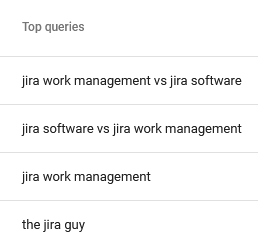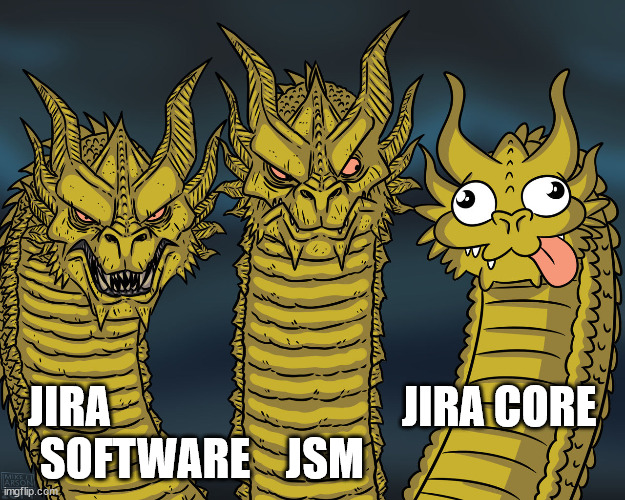Before we get started, let me take a moment and say, “Wow.” I figured a piece about Log4Shell would be popular, but in just about every way I can measure it, the post blew up. So thank you to all those who shared it, commented, and liked it. Now only if Atlassian wouldn’t release an update the following day…
In speaking of which, yeah – they did that. As it turns out, while Atlassian On-Premise products are not directly affected by Log4Shell, Bitbucket Server & DC depends on Elasticsearch, which was. So they updated their advisory on Thursday. I, in turn, updated my post to reflect the new information. So go back and read it if you haven’t heard that update yet.
Today, the topic was chosen by you – quite literally. I’m a stats nerd, so of course, I have the blog monitored in every way I can think of. One of those monitors, Google’s Search Console, revealed an interesting tidbit.

First off, people searching for “the Jira guy” is only fourth. I mean, I suppose the URL is easy enough to remember, so that explains that. Secondly, the top three searches that end in clicks are centered around Jira Work Management, with the top two trying to find the differences between Jira Software and Jira Work Management, which is fair enough. They are both Jira Products, and on a surface glance, have very similar functionality. So I figured we would take today’s article and do just that – dive into the two products, and what makes each of them unique, and why you would want to choose one over another.
Platform Choice
The first difference that would lead you to choose one over the other would be Platform. By this, I mean are you on Jira Cloud, or are you running Jira Server/Data Center? If you are on the latter, the decision is already made for you.
You see, Jira Work Management is only available for Jira Cloud. From the little talks I have had with Atlassian on the topic, there are no plans to bring JWM to Jira Data Center. Personally, I feel this is a huge mistake. Some of Atlassian’s most prominent customers use Jira Data Center, and I know they would benefit immensely from Jira Work Management. I get it – Atlassian would love to drive Cloud growth, and the best way to do that is to have the best exclusive features on that Platform. But this decision – I’m not a fan of if you couldn’t tell.
If you are fortunate enough to be on Cloud, you still have a choice. Jira Work Management effectively replaces Jira Core on cloud instances, giving you many new features in the process. We’ll go over them in detail in a bit, but suffice it to say whether you are on Cloud or not has a big impact on choosing Jira Software vs. Jira Work Management.
Templates
To me, this is still the stand-out feature for Jira Work Management. Let me explain.
When Atlassian first consulted me about how Business teams use Jira, I brought up this problem. If you are a Software or IT Team, you are golden in Jira. They have had project templates out of the box for years that cover these scenarios. For Jira Software, these are the Basic, Scrum, and Kanban projects. Anything beyond those is up to the Jira Admin to customize from these bases.

However, things became problematic when I tried to expand Jira beyond those functional groups. It probably goes without saying, but I have never been an HR representative, a recruiter, a lawyer, or any other business function outside of Software Development and IT. However, I would still be expected to design a process to work with these groups. Which often meant I would be taking either a JSM or Jira Software project (because Jira Core has no useful features) and rebuilding them from the ground up for these teams. This process took a significant amount of time – time I could spend doing other things to help my users.
From this was born the most significant feature of Jira Work Management: Project Templates. My challenge to Atlassian was not to have a drop-in project that would work for every team ever. No – my challenge was just to get me 90% of the way there. Spending 10% of the effort on the final fit-and-finish of the project for my specific teams is a lot better than spending 100% of the effort to build them a bespoke solution every time.
This is one reason why I would advocate for Jira Work Management. It has the templates for other business functions that get you a lot closer to a finished project for them than you would get with customizing a Jira Software Project. It also allows your Non-tech teams to get into Jira faster to start learning their individual pain points. From there, you can start customizing to address these individual needs.
Jira Boards
While we were doing our early talks leading up to JWM, I told Atlassian that I rarely recommended Jira Core for business users. Nothing against Jira Core – it just can’t do much. On the other hand, Jira Software’s boards are a fantastic way to organize and display work. So even if a team wasn’t on an Agile process, I would often still start with a Kanban board to give users access to this powerful tool.

Atlassian seemed to take this to heart when developing Jira Work Management, including very board-like functionality within the JWM projects. Honestly, this is an excellent alternative to a Jira Software Project for non-agile teams, as I would often find that users would end up “Drowning” in choices and features that they had no use for in an old Jira Software project.
Don’t get me wrong; I am not advocating using Jira Work Management exclusively. If your team – even a non-software team – is using an Agile process, you should be using Jira Software. But if your team isn’t using one of the various Agile processes and still tries to use Jira Software, they will see a bunch of reports and features that are useless to them.
So, how do you choose?
Ultimately, this isn’t a per-instance process. You aren’t limited to Jira Software or Jira Work Management. In fact, if you have a Jira Software Cloud instance, you already have access to Jira Work Management – on that same instance.
This decision, as I see it, is a per-team choice. For each team, you need to decide on a bunch of factors. How familiar are you with what the team does? Do they run an Agile program or do something else to manage work? Do they need functionality – like a request form – that isn’t available on Jira Software? Does this team still have some Excel holdouts? Why is that?
All these factors go into your final decision. The point is to look at the complete feature set of both products and choose which is correct for a given team.
Here’s how I break it down (again, assuming I’m on Cloud and have a choice):
First question: Are they agile?
If they are, you should put them on Jira Software and be done with it. It has the reports and tools they can take advantage of to tell how well they are performing.
Second question: How familiar are you with what they do?
One thing that always fascinates me is that a Jira Admin can come from almost any walk of life. So having a Jira Admin who is also a practicing Lawyer is not out of the question. Having a Jira Admin with a background in HR? Yeah, I’ve seen it. Given that, I can’t say what each Admin brings to the table as far as experience.
So, if you were required to build a project from scratch, how painful would that be given your experience? Do you know all the details the users haven’t thought of yet? If you can say yes, and still want to go with Jira Software to build out a bespoke solution, go for it. But if you have any doubts (or, like me, have a million other things to do), it might be worthwhile to go with a Jira Work Management Template to get you most of the way done.
Third question: How Technical is the team?
If you are dealing with a very technical team who can articulate exactly what they want, it might be worthwhile to give them the freedom that comes with a Jira Software project. That way, you can configure it to give them exactly what they want. But if you have doubts about this, go with Jira Work Management. It gives them plenty of features, many of which were designed with them in mind.
What are your thoughts?
Have you recommended Jira Work Management for any teams? Let us know in the comments! Don’t forget you can find new posts, all my social media links, and links to support me directly on Linktree. I would very much like to move away from sponsored posts and move to a model where you, the readers, are my customers, and the best way to do that is to have you support the content you like to see, either directly via the “Buy Me a Coffee” link on Linktree, or via Patreon.
You can also subscribe to the blog below. Subscribing allows us to deliver new posts directly to your inbox, which is the fastest way to be alerted to new posts from the blog.
As a programming update – I am trying to start streaming on Wednesdays to take your questions about the latest post, Jira in General and get into hijinks. However, today must be an exception. Today is my wife’s birthday, and I’m taking the evening off to spend with her. So instead, I will try to stream Tomorrow, 12/23/2021, at 5 PM Eastern. You can find me on Youtube and Twitch, and I hope to see all of you there!
But until next time, my name is Rodney, asking, “Have you updated your Jira issues today?”

Hey Rodney,
Some quick thought, the JWM seems to be on top of the Jira Software license, or am I missing something here?
Seems that it can be a cool solution for having it work as ITSM, wouldn’t it?
BR,
Max Fokin
LikeLike
I personally use Asana for work management and plug in Jira Software for technical projects, but I’m curious whether switching over to JWM would be worth it.
LikeLike